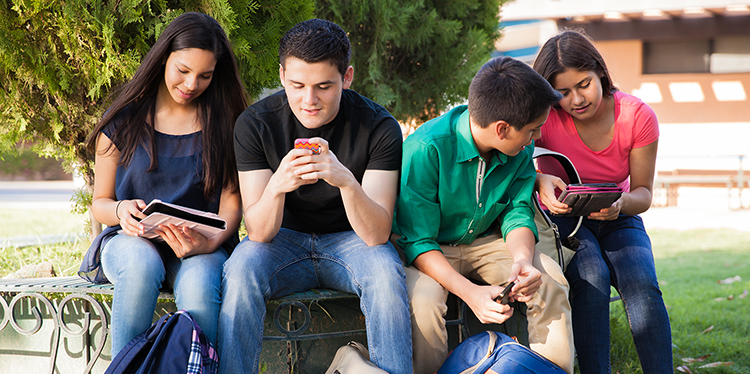Lots Of Time On Social Media Linked To Anxiety, Depression In Teens
- Home
- Lots Of Time On Social Media Linked To Anxiety, Depression In Teens

Lots Of Time On Social Media Linked To Anxiety, Depression In Teens
Teens who spend more time with social media are more likely to suffer from social withdrawal, anxiety or depression, a new study says.
Twelve- to 15-year-olds who spent more than six hours a day on Facebook, Instagram, Twitter and other social media were nearly three times more likely to have these types of “internalizing” mental health issues, researchers report in the journal JAMA Psychiatry. The study was published online Sept. 11.
“The more time you spent on social media, adolescents were more likely to have issues like anxiety and depression on follow-up,” said lead researcher Kira Riehm, a doctoral student at Johns Hopkins Bloomberg School of Public Health in Baltimore. “It was a pretty clear-cut association.”
These teens also were more than four times as likely to have both internalizing and externalizing mental health problems, researchers said. Externalizing problems include bullying, acting out and having trouble paying attention.
For the study, researchers analyzed nationwide data from a U.S. federally funded survey of nearly 6,600 teens. It was conducted between 2013 and 2016.
Fewer than 17% of teens said they used no social media, researchers found. About 32% said they spent less than 30 minutes a day on social media; 31% spent between 30 minutes and three hours; 12% spent three to six hours, and 8% said they used social media more than six hours per day.
As use increased, so did the risk of problems with anxiety, depression or feelings of isolation.
For example, kids who used social media 30 minutes to three hours a day had nearly twice the risk of internalizing problems, compared with kids who didn’t use social media at all.
But kids who used social media three to six hours a day had 2.5 times the risk, and at more than six hours were nearly three times as likely to have internalizing mental health problems.
The same pattern emerged among kids who had both internalizing and externalizing problems, researchers said. But links between social media use and externalizing problems alone were inconsistent.
Researchers concluded that teens who spent more than three hours a day on social media could be at increased risk for mental health problems.
Other studies have found similar effects, but no one’s quite sure why social media might have this impact on teenage minds, Riehm said.
It could be that social media harms a teen’s self-esteem by creating the illusion that everyone else is much happier and better off, she said.
“Even if your life isn’t going great, you can make it seem like it’s going super well on social media,” Riehm said. “It’s possible adolescents who are spending a lot of time on social media see people having a great time in their life and doing really well, and any issues they have just seem that much worse.”
The findings are consistent with other studies, but some debate persists about how much impact this technology has on people’s moods and minds, said Dr. Cesar Escobar-Viera, a postdoctoral associate at the University of Pittsburgh Center for Research on Media, Technology and Health. He wasn’t involved with the study.
There’s also disagreement about whether the amount of time spent on social media — the measure used in this study — is the only way to gauge its impact on people, he said.
For example, prior research has shown that the number of social media sites people use might also be a problem. Using one or two might have a different effect on your mood than using 11 or 12 sites, Escobar-Viera said.
“We think the number of platforms people use or the behavior people have on social media are also potentially strong indicators of mental health issues,” he said.
Because this is an observational study, it also can’t be clear in which direction the relationship runs, Escobar-Viera said. It might be that using social media causes these mental health issues, or conversely, that kids with these problems are more drawn to social media.
Riehm suggested parents who are concerned about the effects of social media on their kids check out the Family Media Use Plan developed by the American Academy of Pediatrics.
The plan “helps set developmentally appropriate expectations for digital media use,” she said. These might include parts of the home where screens are not allowed, times of day when screens are forbidden, and device curfews.
Source: Health Day
Classic Ghana
Classic Ghana brings you into a fun world of arts, entertainment, fashion, beauty, photography, culture and all things in between. Let’s explore these together!


